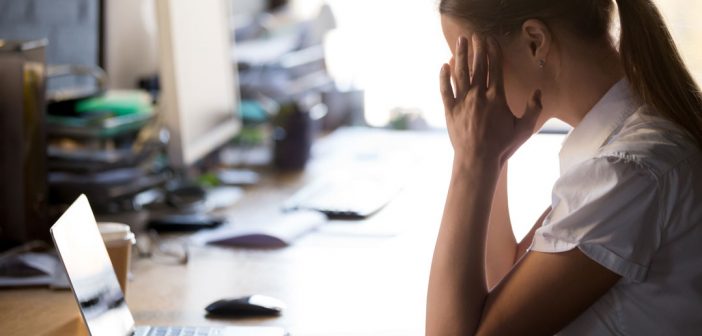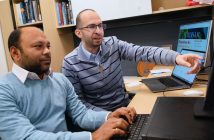“Heightened worry, fear, and anxiety are understandable responses to the uncertainty, disruptions, and challenges that our students—and really all of us—are currently experiencing in the context of the COVID-19 pandemic,” Ng said.
With news and information flowing rapidly, these emotions are normal, Ng said, But he cautioned that they could also contribute to a disproportionate reaction from some people.
“It’s important to not overestimate—or underestimate—the risks and threats of the current situation, which we’re more likely to do in situations that are unfamiliar or novel,” he said. “Being able to identify and distinguish between real and perceived risks is important for ensuring that our worries, anxieties, and behaviors are proportional to the actual circumstances.”
Carol Gibney, an Ignatian yoga teacher and campus minister at Fordham, emphasized that it’s important to take care of oneself and focus on what can be controlled.
“I think that first and foremost is to try to stay safe and healthy—you can’t help anyone else unless you help yourself,” she said.
Still, Gibney said during a crisis like this, the Jesuit practice of being men and women for others is more important than ever.
“Check in on people that we know tend to isolate,” she said. “Continue to have conversations with each other—whether it’s on the phone or if it’s virtual.”
Ng said it’s important for parents, faculty, and others to pay attention to specific student populations who might be more vulnerable to “worsening mental or emotional health concerns.”
Some of them might be specifically concerned about campus closing, such as graduating seniors, who may be grieving the abrupt loss and disruption of their anticipated “senior experience,” or students who are vulnerable to loneliness and social withdrawal.
Students with pre-existing mental and behavioral health concerns, such as anxiety, depression, and substance abuse or dependence, as well as those from lower income backgrounds who may not have secure housing, food, internet access, or other essential resources for online and remote instruction may also be particularly at risk.
He also warned that Asian and Asian-American students might be vulnerable due to increased anti-Asian bias, discrimination, prejudice, and stereotyping. And international students might be dealing with prolonged separations from their loved ones.
While Ng said his office will be providing essential mental health services to students remotely during this time, through phone calls, Zoom, and Webex, he also encouraged students to identify, become familiar with, and utilize local mental health resources and supports in their communities.
For everyone dealing with new restrictions and the anxieties that come with them, Ng and Gibney offered tips that can help make this period go as smoothly as possible.
Find a Community
Social distancing, or for those who might have been exposed to the virus, self-isolation, can feel lonely, Ng and Gibney said. But staying in touch with your friends, family, and other loved ones can make it a little easier.
“Students can still interact with those they live with,” Ng said. “And they can of course use email, social media, video conferencing, phones, etc. to interact and stay connected with their friends and family remotely.”
Gibney said that she and a group of her friends have started a “gratitude text thread” to help them feel less stressed during this time.
“We started a gratitude list— we share three things (daily) that we’re grateful for,” she said.
For people of faith, particularly those who are missing their faith community because their local place of worship is closed, Gibney suggests finding a prayer they can pray at home to help them find strength. Gibney said both of the prayers address the uncertainty and needs of this time and she’s incorporated them into her prayer routine— “Lockdown” by Father Richard Hendrick and a prayer from Kerry Weber, the executive editor of America.
“Heal those who are sick with the virus. May they regain their strength and health through quality medical care,” Weber’s prayer, posted on March 2, read. “Heal us from our fear, which prevents nations from working together and neighbors from helping one another. Heal us from our pride, which can make us claim invulnerability to a disease that knows no borders.”
Get Outside
While authorities have urged people not to gather together in groups and to maintain a physical distance of approximately six feet from others, that doesn’t mean everyone has to be housebound.
“Unless instructed otherwise by our local/national health authorities, social distancing doesn’t mean never leaving our homes, going for a walk, shopping for groceries, or interacting at all with others,” Ng said. “What it does mean though is that we’ll need to be doing these things in a more limited, intentional, and conscientious manner.”
Gibney said one of her favorite ways to feel centered is to explore nature.
“The great outdoors always speaks to me—looking at the clouds, looking at a tree, being aware of nature’s beauty—are ways that can help people find consolation,” she said.
Before going outdoors, people should review and follow instructions of local authorities and maintain proper social distancing.
Take Care of Yourself
A good way to handle a lot of the emotions and uncertainties during this time is to allow yourself to feel them and then let them out, Ng said.
“Acknowledge, lean into, and express your feelings rather than avoiding or suppressing them, he said. “This can be done in a variety of ways, including journaling, painting, dancing, or talking—remotely if necessary—to a friend, family member, mentor, or mental health professional.”
He also encouraged everyone to strengthen their self-care practices and attend to basic needs, such as sleep, diet, exercise, and social connection, while maintaining self-compassion in case not everything can get done.
“The current circumstances will likely make it more challenging for us to stay on track or get things done as effectively as we might have wanted or planned for,” he said. “Being kinder, gentler, and more patient with ourselves when this happens will go a long way toward preserving and enhancing our mental health and well-being.
Step Away from the News
The round-the-clock information pouring in from the media can be overwhelming.
“I think it’s important just to step away from the constant newsfeeds and news stations, which can raise anxiety in people,” Gibney said.
Ng recommended that people “be more intentional and discerning about the news and information they are consuming,” and try to focus more on factual news, instead of sensational pieces that could spread misinformation. He also recommended putting a time limit on how much COVID-19 news a person consumes each day.
Seek Help if Needed
Above all else, Ng said that if someone begins to experience any of the following, they should seek professional help: persistent sadness, anxiety, anger, irritability, hopelessness, or feelings of being completely overwhelmed; sustained loss of interest in social or pleasurable activities; significant impairments or changes in daily functioning, such as sleep, appetite, or hygiene; thoughts about death, dying, or suicide; and impulsive, reckless, or risky behaviors, such as substance abuse or self-injury.
Being Present:
While so many things can seem out of our control, Gibney called on all to focus on what they can control in this time and find calm where they can. That can also help people be there for others.
“Just try to be present for our loved ones, our colleagues, and friends and family,” she said.



